

Business Ethics
This week we will study the applied issue of business ethics. Much as ethics is the attempt to define and understand right and wrong, i.e., what is morally permissible for an individual, business ethics is the search for what is right and wrong within the workplace. Some relevant questions are:- moral agency - are organizations moral agents?
- purpose - do organizations have any moral end other than making money?
- obligations - what, if any, are a firm's obligations to its employees; what is owed by employees to employers?
- advertising - does anything go?
- whistleblowing - under what conditions is whistleblowing morally permissible?
- CSR - are companies obliged to care for the environment?
Check out this intro video:
Ends, Means, & Character in Business
How might we join normative theory with business? :
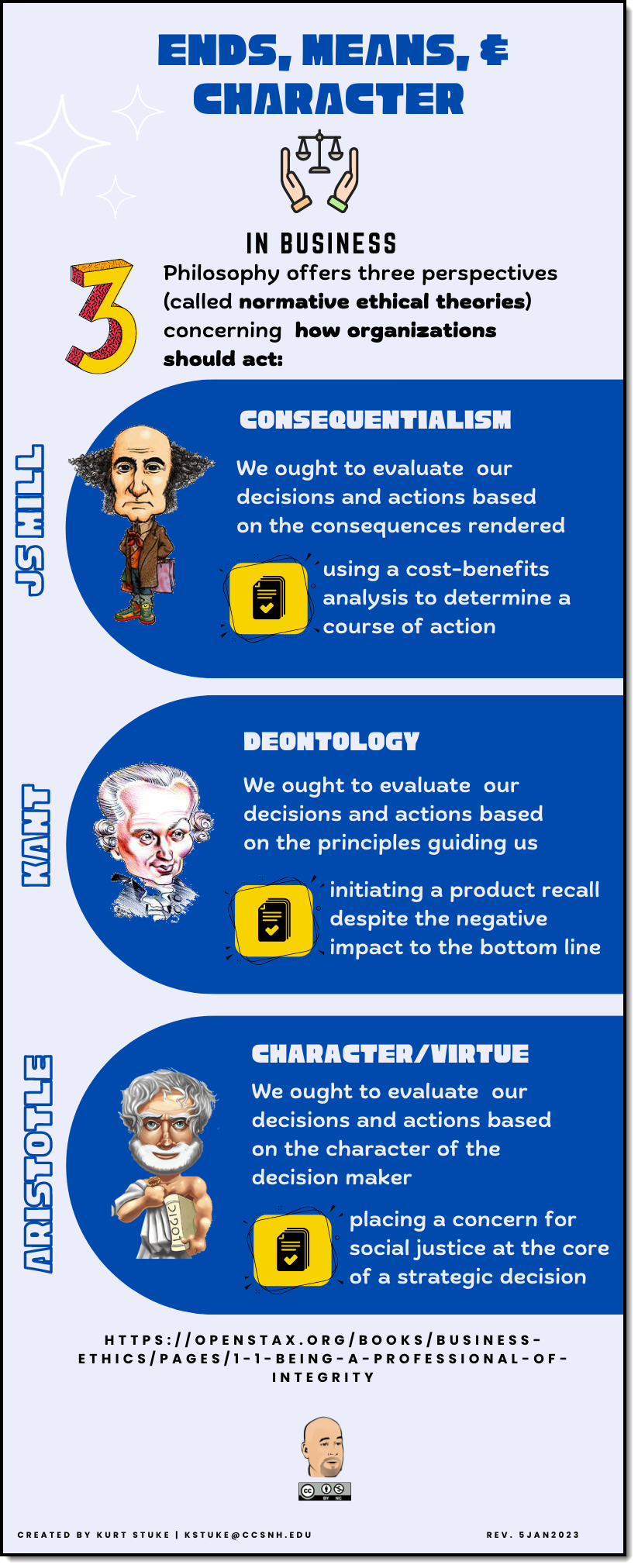
Another way to connect ethical theory with business is through a focus on leadership. For example, Aristotle's concept of "phronesis" can be helpful in guiding a leader within the scope of virtue ethics:
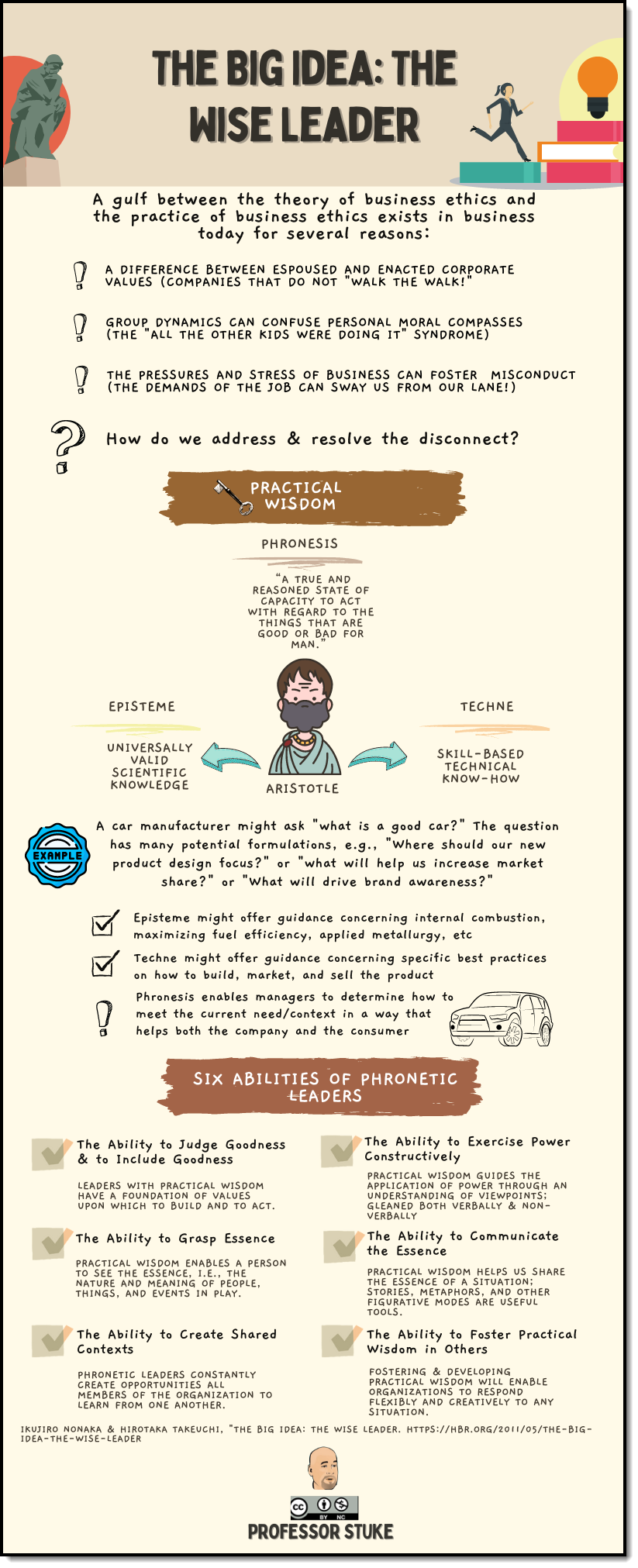 Sometimes actual leaders and their scenarios are studied to gain insights into ethical leadership! Here is an interesting case focused on Tyco's former CEO:
Sometimes actual leaders and their scenarios are studied to gain insights into ethical leadership! Here is an interesting case focused on Tyco's former CEO:CASE STUDY: Dennis Kozlowski
https://ethicsunwrapped.utexas.edu/case-study/dennis-kozlowski-living-large

Questions
- Do you think Dennis Kozlowski was an effective leader for Tyco International? Were his actions ethically permissible? Why or why not?
- As CEO of a major company, how might entitlement bias have affected Kozlowski’s behavior?
- What rationalizations do you think Kozlowski might have used to justify his behavior in his own mind?
- If you were in Kozlowski’s position, how do you think your actions would affect the behavior of your employees? Why?
- Can you think of any other examples of leaders who have abused the power of their position? What similarities and differences do you see between them and Kozlowski?
Consider the Ford Pinto
One of the more productive ways to gain ethical insights is through the analysis of actions taken by actual organizations. Consider the case of the Ford Pinto:
https://kurtstuke.com/CT/Stakeholders/
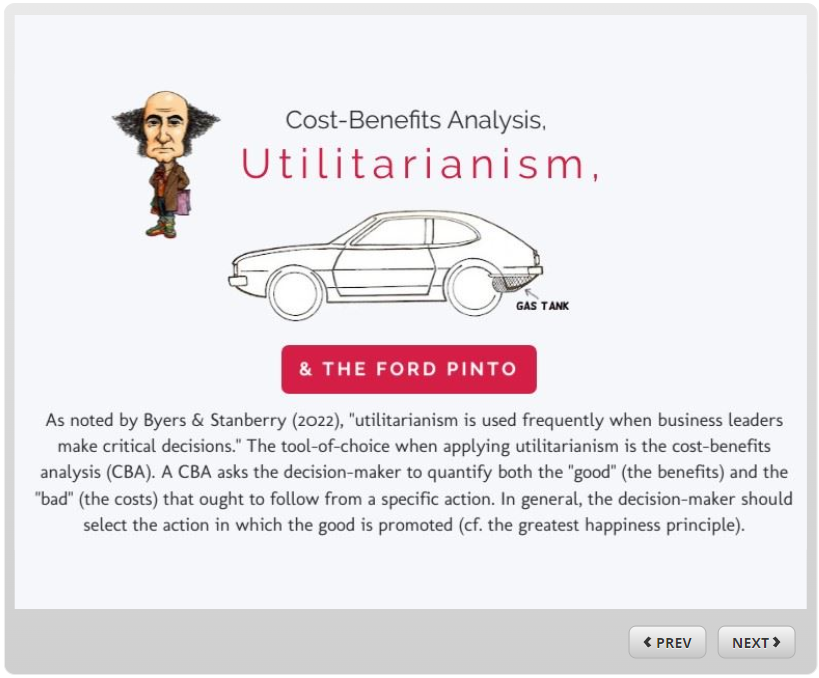
Questions
- Utilitarianism asserts that we should act toward the greatest good for the greatest number? How was the "good" defined here?
- Is what happened a negative reflection of Ford, the CBA and Utilitarianism, or none of the above?
Consider the VW
Volkswagen's Emissions Evasion
Discussion
- What factors led Volkswagen’s managers to make the decision to try to cheat environmental tests via a “defeat device?” Explain how each of the following concepts was apparent in this decision: ethical fading, incentive gaming, framing, bounded ethicality, bounded rationality, obedience to authority, and conformity bias.
- When the software-based defeat device was first used by Volkswagen in 2008, why do you think those involved decided to use the defeat device?
- How did Volkswagen frame its goals? Do you think ethical considerations were in the managers’ frame of reference? Why or why not?
- Did the fact that its profit goals seemed immediate and concrete while the victims of pollution seemed very distant impact the decision making of the company’s employees? Explain.
Organizational Culture
Yet another avenue for gaining ethical insights through business ethics is through a consideration of organizational culture. Culture is a powerful force in shaping relationships, norms, and practices. Perhaps the most well-known tool for understanding an organization's culture(s) is Hofestede's Cultural Dimensions:
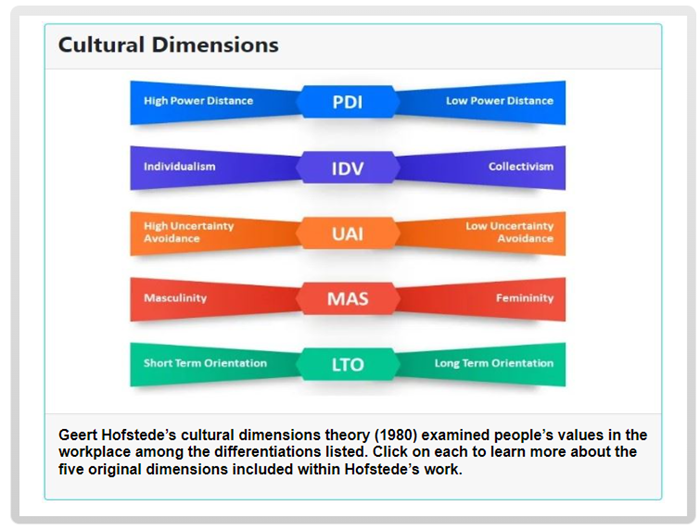
What difference might culture make to you?
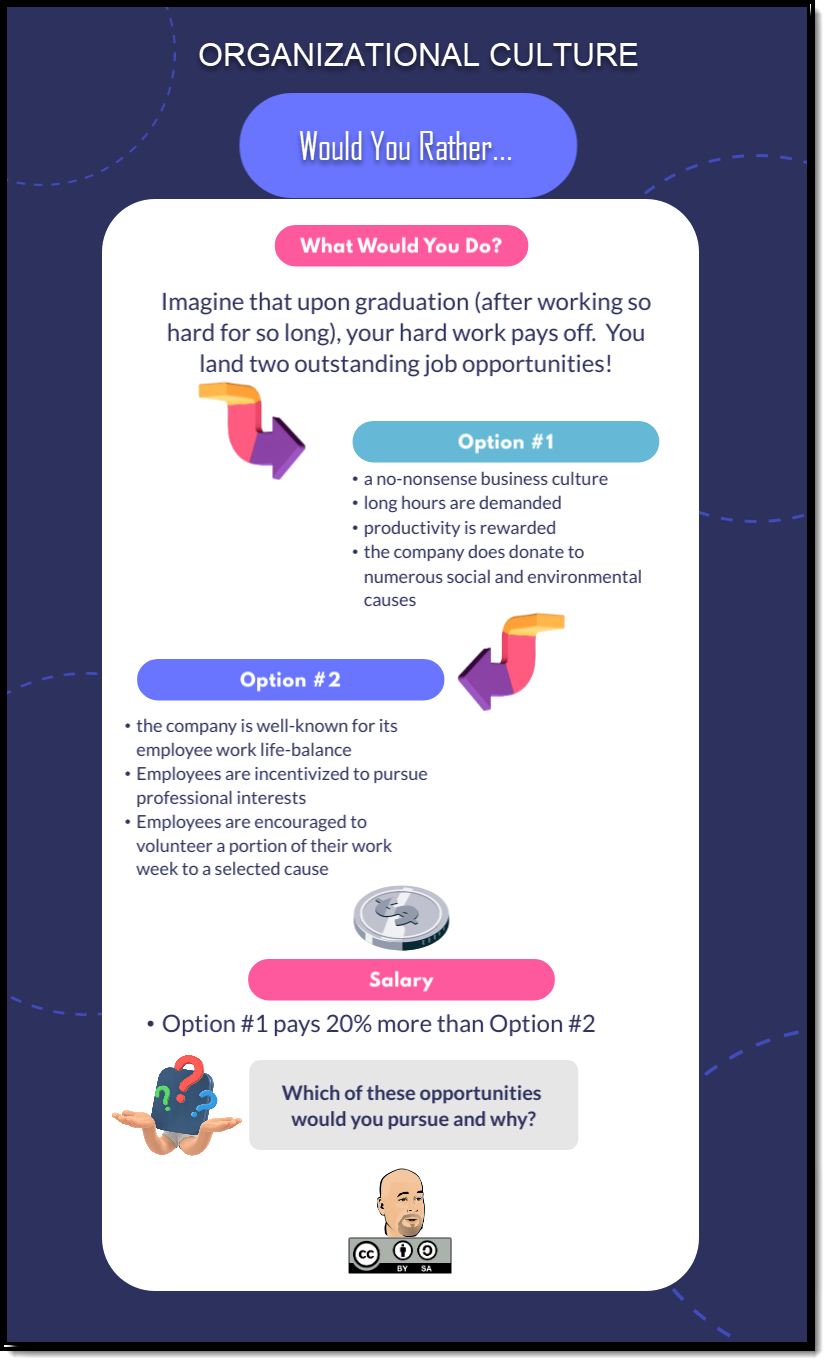
Organizational culture has at least three types; check out this video for an overview of organizational culture based on a salad analogy!
Unionization - Balancing Obligations
The recent unionization case at Amazon offers an opportunity to study not only what an employer owes employees but what an employee owes an employer:
https://kurtstuke.com/OER/Environment/Amazon/
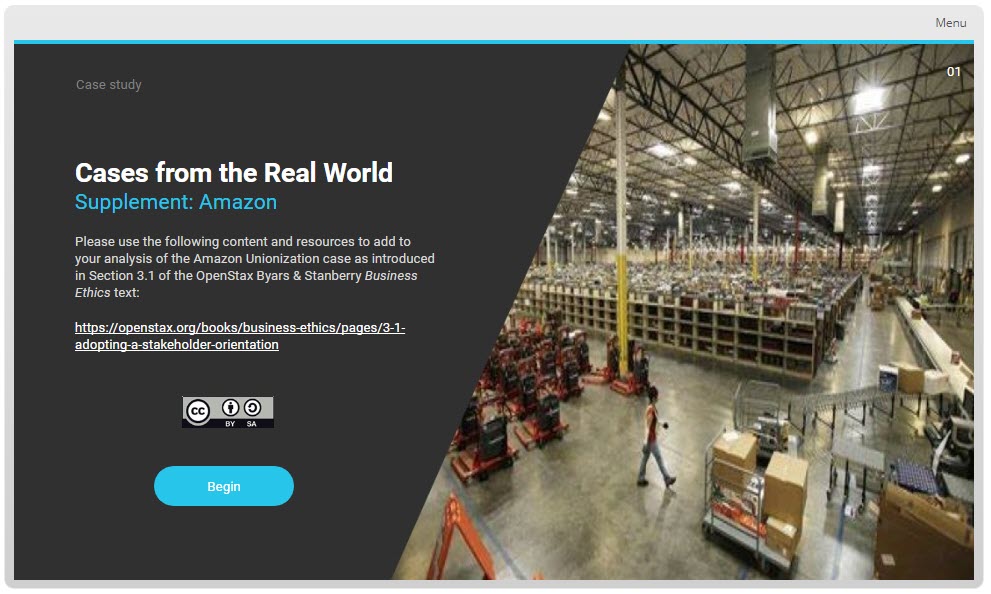
Greenwashing Interaction: A Fiji Water Story
Questions:
- Is eco-friendly marketing a positive or negative force?
- How did Fiji Water use green marketing to construct an eco-friendly narrative to what was described as a non-eco friendly company?
- What do you make of the stat that 47% of Fijans do not have access to clean water?
- What impact will the information offered through the video have on your purchasing and consuming habits?
Whistleblowing: Ed Snowden
https://ethicsunwrapped.utexas.edu/case-study/edward-snowden-traitor-hero
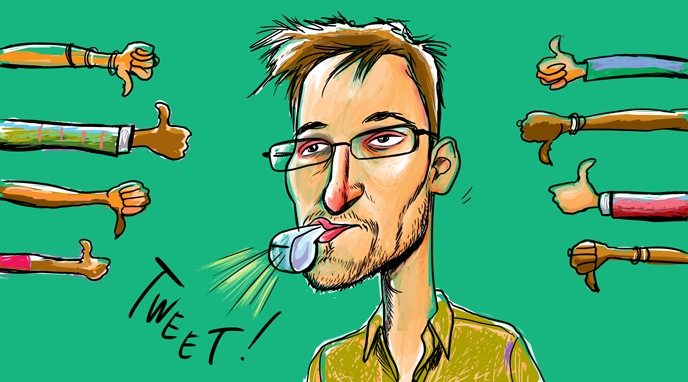
Questions:
- What values are in conflict in this case? What harm did Snowden cause? What benefits did his actions bring?
- Do you agree that Snowden’s actions were ethically justified even if legally prohibited? Why or why not? Make an argument by weighing the competing values in this case.
- If you were in Snowden’s position, what would you have done and why?
- Would you change your position if you knew that Snowden’s leak would lead to a loss of life among CIA operatives? What about if it would save lives?
- Is there a circumstance in which you think whistleblowing would be ethically ideal? How about ethically prohibited?
CSR
Corporate Social Responsibility, or CSR, is a framework for balancing the drive for profit while increasing a company's positive social and environmental impact:
Shareholder versus Stakeholder View
Once upon a time, many businesses operated with a bottom line that focused solely on increasing the financial bottom line. Those who worked at the organization or who owned shares in the company were designated as the primary beneficiaries of the bottom line. This view is therefore referred to as the shareholder view. One advocate of the shareholder and singular bottom line was Milton Friedman.
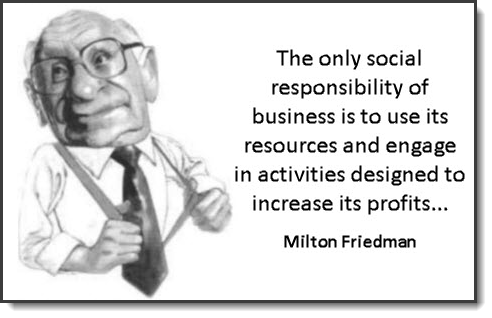
While many businesses continue to operate on a single bottom line and shareholder basis, over the past several decades many businesses have expanded the traditional bottom line (focused solely on profit) to one that also include people and planet. Accordingly, this view is referred to as the Triple Bottom Line or TBL. Those entities who have a stake in the success of the organization are designated as stakeholders.
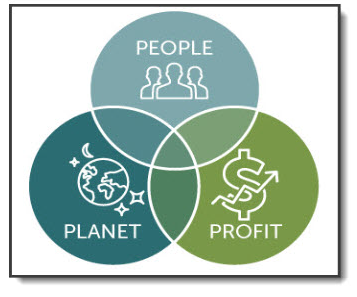
Below is an infographic discussing the TBL. As you can imagine, one potential barrier is how do you measure return outside of profitability:
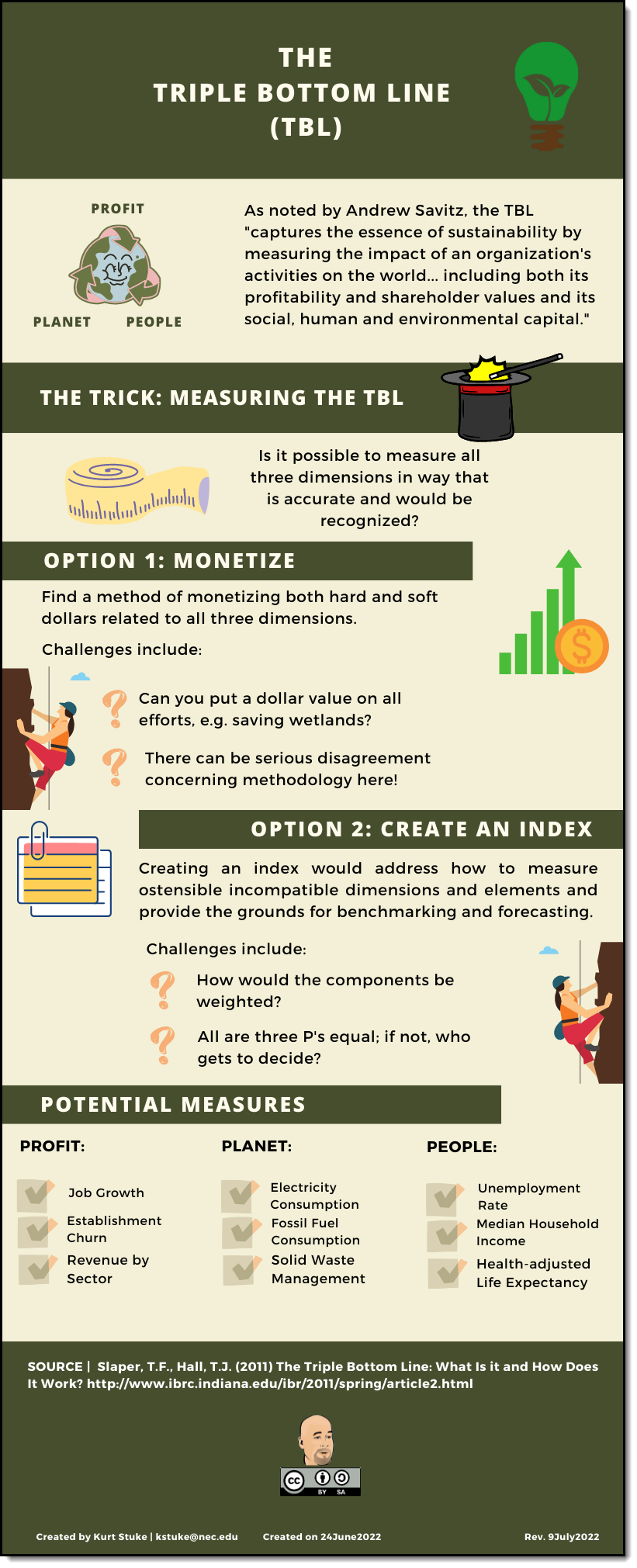
CASE STUDY: Ben & Jerry's
For this exercise, we will use the following Openstax text: https://openstax.org/books/business-ethics/pages/3-4-corporate-social-responsibility-csr.
In section 3.4, the authors asked if Ben and Jerry's Ice Cream were "greenwashing" due to the use of CAFOs within their supply chain. Here is the "Cases from the Real World" from the Byers & Stanberry text:

VIDEOS:
Questions:
- Does the use of CAFOs compromise Ben & Jerry's mission?
Supplemental Resources
SEP:
1000 Word Philosophy:
Ethics Unwrapped